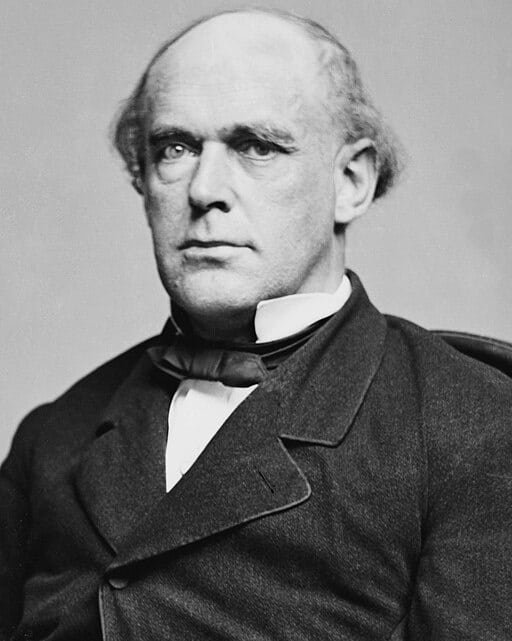Salmon Chase (1808-1873) was born in New Hampshire, educated at Dartmouth College and read law in Washington, D.C.
Chase moved to Ohio where he established his law practice and was elected as a U.S. senator and governor. He was an ambitious man who was vital to the establishment of the Republican Party and its opposition to slavery.
Abraham Lincoln nominated Chase first to the post of secretary of the treasury (his picture is on the $10,000 bill) and then as the sixth chief justice of the United States, where he served from 1864 to 1873.
As one who had vied for the 1860 Republican presidential nomination, Chase never gave up his own aspiration to be president.
In striking contrast to Roger B. Taney, his predecessor as chief justice, Chase had proceeded on the assumption that the U.S. Constitution was an anti-slave document. He had accordingly opposed the Fugitive Slave Law of 1850 and the Kansas-Nebraska Act of 1854, the latter which allowed for the expansion of slavery in the territories.
Chase sought for an interpretation to apply Bill of Rights to states
Once the 13th Amendment was ratified in 1865, Chase sought unsuccessfully for an interpretation that would have effectively overturned the Marshall Court decision in Barron v. Baltimore (1833) by applying the egalitarian language of the Declaration of Independence and the Bill of Rights to the states via the 13th Amendment that had eliminated chattel slavery. He dissented, however, from the decision in Cummings v. Missouri, 71 U.S. 277 (1866), believing that a state did have power to bar a Catholic priest who had aided the Confederacy from preaching because of his refusal to take an oath to uphold the state constitution.
Chase was the first chief justice to preside in the Senate over the impeachment trial of a president (Andrew Johnson), who was not convicted.
Chase dissented in Slaughterhouse Cases, which limited 14th Amendment
Chase dissented from the famed Slaughterhouse Cases (1873) in which the Supreme Court took a very narrow view of the privileges and immunities clause of the 14th Amendment, thereby limiting its effectiveness in applying protections in the Bill of Rights, including those in the First Amendment, against actions by the states. The Supreme Court later incorporated First Amendment guarantees to the states via the due process clause of the 14th Amendment.
In Texas v. White, 784 U.S. 700 (1869), Chase affirmed that the U.S. Constitution had created “an indestructible Union, composed of indestructible States,” which meant that the southern states had never legally seceded from the Union. In the case of In re Debs, 158 U.S. 564 (1895), the court later quoted Chase’s decision in Lane Co. v. Oregon, 74 U.S. 71 (1869), affirming both state and federal powers, to uphold an injunction against Eugene Debs who was leading a strike.
In Ex Parte McCardle, 74 U.S. (7 Wall.) 506 (1868), a case involving an appeal by a newspaper editor who had been arrested for writing an incendiary article, Chase ruled that the Supreme Court no longer had jurisdiction of the case because Congress had the right to repeal the law, which had allowed McCardle to appeal his case.
After Chase’s death, President Ulysses S. Grant appointed Morrison R. Waite as chief justice.
John R. Vile is a professor of political science and dean of the Honors College at Middle Tennessee State University.

